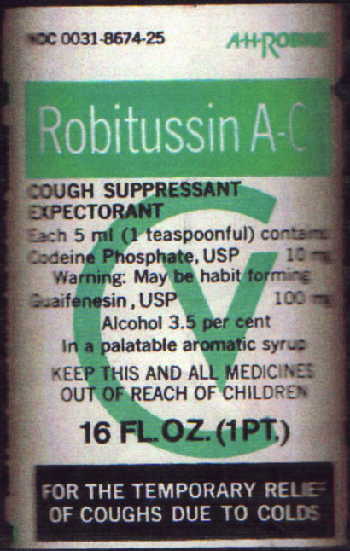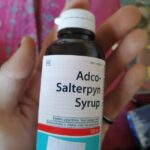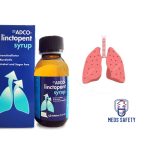Robitussin A-C Syrup: Uses, Dosage, Side Effects, Interaction, Addiction

What is Robitussin A-C Syrup?
Robitussin A-C Syrup is a commonly used over-the-counter medication designed to relieve symptoms associated with respiratory conditions such as coughs and colds.
Robitussin A-C Syrup is primarily used to alleviate symptoms related to respiratory issues. The key active ingredients in this medication are guaifenesin and codeine. Guaifenesin is an expectorant that helps loosen mucus and phlegm in the respiratory tract, making it easier to cough up. Codeine, on the other hand, is an opioid cough suppressant that works in the brain to reduce the urge to cough. Each 5ml of Robitussin A-C Syrup contains 100mg of guaifenesin and 10mg of codeine.

The combination of these ingredients makes Robitussin A-C Syrup effective in treating persistent coughs associated with conditions such as:
1. Common colds
2. Influenza
3. Bronchitis
4. Sinusitis
5. Other respiratory infections
Dosage Recommendations
It is crucial to follow the recommended dosage guidelines to ensure the medication’s effectiveness and minimize the risk of adverse effects. Dosage instructions may vary depending on the specific formulation and concentration of Robitussin A-C Syrup. Always refer to the product label for accurate information. Generally, the typical dosage includes:
1. Adults and Adolescents (12 years and older):
• Take 10 mL (2 teaspoons) every 4 hours as needed.
• Do not exceed 60 mL (12 teaspoons) in a 24-hour period.
It is essential to use the provided measuring device to ensure accurate dosage. Consult a healthcare professional if symptoms persist or worsen.
Potential Side Effects
While Robitussin A-C Syrup is generally well-tolerated, some individuals may experience side effects. Common side effects include:
• Drowsiness
• Dizziness
• Lightheadedness
• Headache
• Facial flushing
• Nausea
• Vomiting
• Upset stomach
• Constipation
• Skin rash
• Itching
• Warmth, redness, or tingling under the skin
If you experience serious side effects, it is important to inform your doctor. Serious side effects of Robitussin AC may include:
• Mental/mood changes, such as hallucinations
• Fast or irregular heartbeat
• Trouble urinating
Seek immediate medical attention if you encounter a severe side effect, such as a seizure. Additionally, Robitussin AC may lead to critical side effects, such as:
• Noisy breathing
• Sighing
• Shallow breathing
• Slow heart rate
• Weak pulse
• Severe dizziness or drowsiness
• Confusion
• Hallucinations
• Unusual thoughts or behavior
• Little or no urinating
• Severe constipation
In case you exhibit any of the symptoms mentioned above, seek prompt medical assistance. Serious eye symptoms, including sudden vision loss, blurred vision, tunnel vision, eye pain or swelling, or seeing halos around lights, and serious heart symptoms, such as fast, irregular, or pounding heartbeats, fluttering in your chest, shortness of breath, and sudden dizziness, lightheadedness, or passing out, require immediate medical care or a call to 911.
Other severe side effects may manifest as:
• Severe headache
• Confusion
• Slurred speech
• Arm or leg weakness
• Trouble walking
• Loss of coordination
• Feeling unsteady
• Very stiff muscles
• High fever
• Profuse sweating
• Tremors
It is essential to note that this list may not encompass all potential side effects, and there could be others not mentioned here. If you have concerns or experience any unusual reactions, consult your physician for additional information about potential side effects associated with Robitussin AC.
Pregnancy and Breastfeeding
Pregnant and breastfeeding individuals should exercise caution when using Robitussin A-C Syrup. Codeine, an opioid, can pass into breast milk and may cause respiratory depression or other adverse effects in nursing infants. Additionally, codeine use during pregnancy, especially in the first trimester, has been associated with an increased risk of birth defects.
Therefore, it is essential for pregnant or breastfeeding individuals to:
1. Consult a Healthcare Professional: Seek advice from a healthcare provider before using Robitussin A-C Syrup during pregnancy or while breastfeeding. They can assess the potential risks and benefits and recommend alternative treatments if necessary.
2. Consider Alternative Therapies: Non-pharmacological treatments or alternative medications with a more favorable safety profile may be recommended to manage respiratory symptoms during pregnancy or breastfeeding.
3. Monitor for Side Effects: If Robitussin A-C Syrup is used under medical supervision, it is crucial to monitor for any signs of side effects in both the mother and the infant.
Interactions
Drugs, Substances, and Supplements that May Interact with Robitussin AC:
1. Cimetidine:
• Interactions with cimetidine, a medication commonly used to treat stomach ulcers and gastroesophageal reflux disease (GERD), may occur. Inform your doctor if you are taking cimetidine.
2. Quinidine:
• Quinidine, a medication used to treat certain heart rhythm disorders, may interact with Robitussin AC. It is important to disclose the use of quinidine to your healthcare provider.
3. Naloxone and Naltrexone:
• Naloxone and naltrexone are medications used to counter the effects of opioids and treat opioid dependence. Interactions with these drugs may occur when taking Robitussin AC. Inform your doctor if you are using naloxone or naltrexone.
4. Medications Inducing Sleepiness:
• Robitussin AC may enhance the sedative effects of other medications that cause drowsiness. This includes but is not limited to:
• Allergy medicine
• Narcotics
• Sleeping pills
• Seizure medicine
• Depression or anxiety medications
Inform your healthcare provider of all medications you are using, especially those that may induce sleepiness.
It is crucial to provide a comprehensive list of all medications, including prescription and over-the-counter drugs, as well as herbal supplements and vitamins, to your healthcare professional. This information helps in assessing potential interactions and ensuring the safe and effective use of Robitussin AC.
Note: The list provided here is not exhaustive, and individuals should consult with their healthcare provider for personalized advice based on their specific medical history and current medications.
Addiction
Robitussin AC contains codeine, an opioid with the potential for dependence and addiction. The opioid nature of codeine puts users at risk of developing tolerance and physical dependence, necessitating increased doses over time. Prolonged use or misuse may lead to addiction, as individuals may seek the drug for its psychoactive effects. Withdrawal symptoms, such as restlessness and anxiety, can emerge upon discontinuation, underscoring the importance of medical supervision and adherence to recommended dosage guidelines.
Risk factors, including a history of substance abuse or mental health disorders, should be carefully considered, and healthcare providers should explore alternative treatments for those at higher risk of addiction. While Robitussin AC can be effective for managing cough symptoms when used responsibly, awareness and education are vital components in preventing abuse and addiction.





